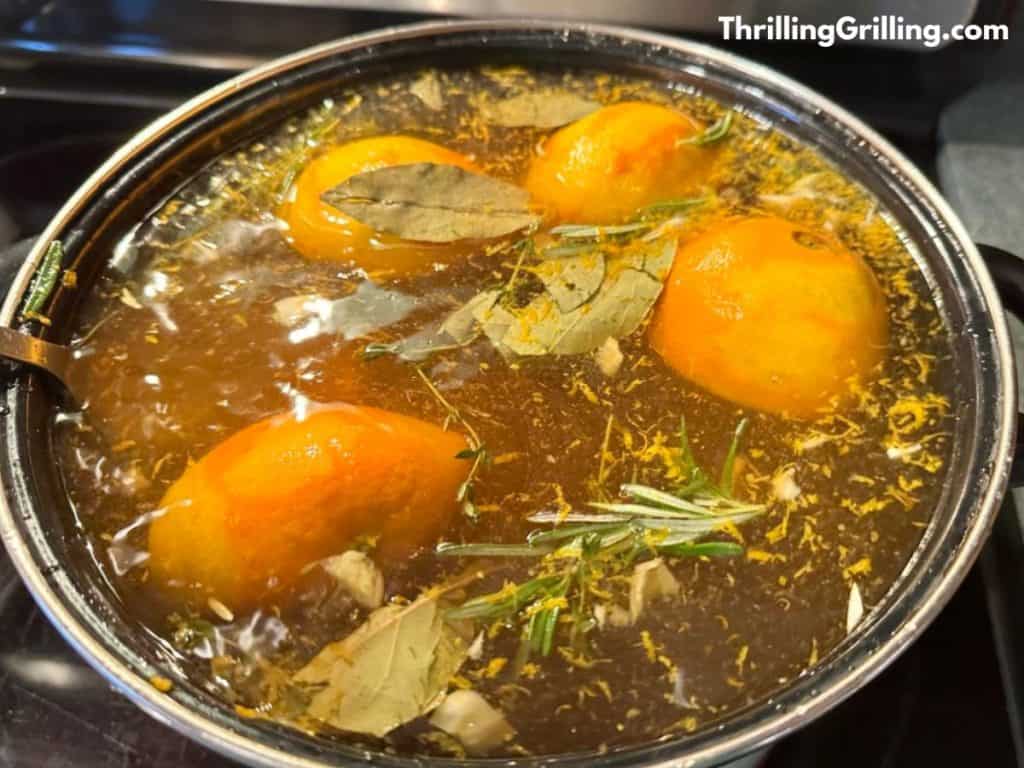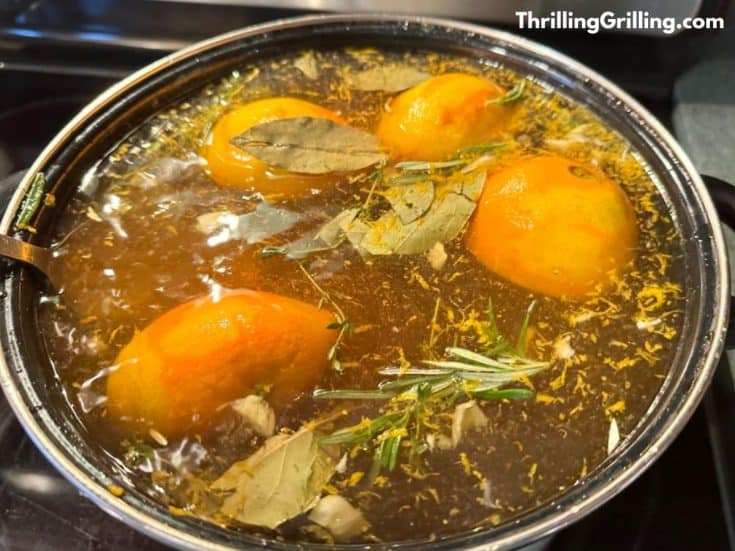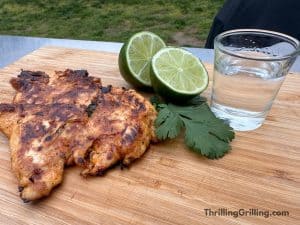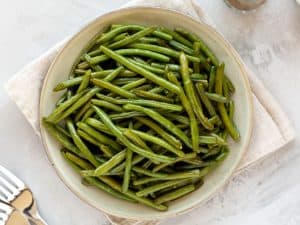If you’ve never tasted a turkey that’s been brined, you don’t know what you’ve been missing. This simple turkey brine recipe takes just a few minutes to prepare and it will give your bird an amazing burst of herbs and citrus flavor.

For many years, I never brined turkey before cooking it. I had heard it was good but it just seemed like such a pain and a lot of unnecessary work.
Then one year we were hosting the whole family for Thanksgiving at our house and we needed to cook two turkeys to have enough for everyone.
I decided to do a little experiment and brined one of the turkeys before cooking it in my smoker. The other turkey was seasoned and smoked the same way, just no brine.
I also didn’t tell anyone but my wife about the brining because I really wanted to see which bird they preferred. Would anyone even notice the difference between the turkey that was brined and the one that wasn’t?
The answer was a resounding YES.
Both turkeys were a big hit with the family. But everyone, myself included, agreed the brined turkey was more moist, tender, and flavorful than the bird that didn’t receive the brining bath.
Ever since then I’ve been a true believer in brining. Try my turkey brine recipe and you’ll never skip brining again.
What You Need
For measured amounts you can scroll down to the full recipe card. But let’s quickly go over the ingredients and equipment you need to brine a turkey.
The ingredient list is pretty simple:
- Apple cider or apple juice
- Water
- Salt
- Brown sugar
- Garlic
- Bay leaves
- Rosemary
- Cinnamon sticks
- Cloves
- Oranges
You’ll also need a large pot to cook the brine, and if the pot isn’t big enough for both the turkey and the brine together you’ll need to use either a brine bag or a sturdy plastic container that is food safe.
I included a link to the container I use below. It works great for brining and also for thawing a frozen turkey. It comes in different sizes but I like the big one so I know I have plenty of room.
- Durable 22 quart square storage container for storing or transporting a variety of foods
- Crystal clear virtually unbreakable polycarbonate allows you to easily identify contents
- Stain and odor resistant to food acids and oils,Length:11 ¼ Inches,Width:12 ¼ Inches,Height: 15 ¾ Inches
- Wide molded-in handles for easy carrying
- Safe to use in refrigerators, freezers and dishwashers; NSF appro
Prices pulled from the Amazon Product Advertising API on:
Product prices and availability are accurate as of the date/time indicated and are subject to change. Any price and availability information displayed on [relevant Amazon Site(s), as applicable] at the time of purchase will apply to the purchase of this product.
Gather all your ingredients together and add them to a large stock pot.
You should mince the garlic or smash it with the side of the knife before adding it.
Use a microplane to zest each orange and then slice them in half and squeeze the juice into the brine, then toss the halves into the brine.
Heat up the brine and bring it to a boil. Keep stirring it until the salt and sugar are fully dissolved. Then remove the brine from the heat and let it cool. You can add a handful of ice cubes or place the brine in a fridge to speed up the process.
Once fully cooled you can add the turkey to the brine and refrigerate for 8 to 24 hours. When you’re ready you can remove turkey and discard the brine. Wipe the turkey down with paper towels and it will be all ready to go!
Pros And Cons Of Brining
Let’s talk very quickly about the pros and cons of brining turkey.
The pros are that you get a lot more flavor and juiciness out of your bird. Turkey itself has a very mild flavor and brining just makes it taste better.
Plus, brining allows the turkey to absorb more water and stay moist while cooking. You’ll never have to worry about carving into a bone dry turkey breast again.
On the other hand, brining means a lot of extra work and time. You basically have to build an additional day into your prep time and deal with the additional mess it makes.
There’s also a health consideration for some people. Brining will add additional salt content to your turkey, and you should keep that in mind if you have a health issue and need to limit salt intake.
Frequently Asked Questions About Brining
What is a brine?
A brine is a mixture of salt and water (and sometimes other ingredients) that’s used to moisturize, tenderize, and flavor food.
The concept is simple: take a protein like a turkey and steep it in a mixture of water, salt, herbs, and spices for several hours or up to a day. Brining gives your turkey added flavor and keeps the meat moist and juicy.
The most basic brine is just a combination of salt and water. But there are limitless possibilities and you can customize your brine to include many different flavor profiles.
Feel free to experiment and try different combinations like cayenne pepper, fresh cranberries, maple syrup, etc. The flavor imparted by the brine will be subtle. You’ll taste a little something extra but it won’t be overpowering.
How long should you brine turkey?
A good rule of thumb is to brine a turkey for one hour per pound. A little longer won’t hurt but don’t brine for longer than 24 hours. Brining a turkey for too long can make the bird too salty and give it an unpleasant spongy texture.
Do you rinse off turkey after brining?
There’s no need to rinse your turkey after brining. Just take a few paper towels and pat it dry to remove excess moisture.
In fact, research completed by the U.S. Department of Agriculture (USDA) found that washing or rinsing meat or poultry increases the risk for cross-contamination in the kitchen, which can cause foodborne illness.
Do you have to refrigerate while brining a turkey?
Don’t leave a turkey sitting on a kitchen counter at room temperature while brining. It needs to be refrigerated to prevent spoilage. Place the turkey in a large food-safe container or brining bag that will fit in your refrigerator.
Can you brine turkey in a cooler?
If you don’t have room in your refrigerator for a turkey along with a few gallons of brining liquid, you can use a cooler to brine a turkey. Add the turkey and brine to a brining bag and place the sealed bag in a large cooler (like this cooler from Yeti) and then cover it with ice. Keep the cooler covered until you’re ready to take the bird out.
Can you over brine a turkey?
Don’t brine turkey for more than 24 hours. Over brining can make the bird overly salty and give it a spongy texture.
Best Turkey Brine Recipe

If you've never tasted a turkey that's been brined, you don't know what you've been missing. This simple turkey brine recipe takes just a few minutes to prepare and it will give your bird an amazing burst of herbs and citrus flavor.
Ingredients
- 4 cups apple cider or apple juice
- 2 gallons water
- 1 ½ cups salt
- 1 ½ cups brown sugar
- 6 cloves garlic
- 5 whole bay leaves
- 5 springs fresh thyme
- 3 sprigs fresh rosemary
- 2 cinnamon sticks
- 1 tablespoon cloves
- 2 oranges (zested and juiced)
Instructions
- Combine all of the ingredients in a large pot and bring to a boil, stirring regularly until all of the salt and sugar has dissolved.
- Remove from the heat and allow the brine to cool completely. You can add a few ice cubes or refrigerate the brine to speed up the cooling process,
- Add the turkey to the brine and refrigerate for 8 to 24 hours.
- Remove turkey from the brine and pat dry with paper towels (no need to rinse the bird).
Notes
You can add a few ice cubes or refrigerate the brine to speed up the cooling process,
If you don't have a big enough pot to fit both the brine and the turkey, you can use a brine bag, a cooler, or a food safe plastic container.
This brine works with any cooking methodi ncluding smoking and roasting in an oven.







Leave a Reply